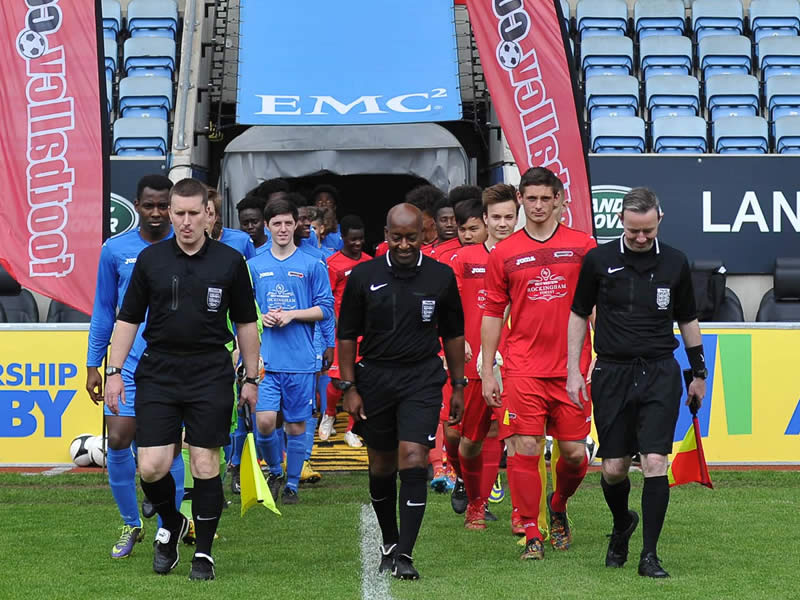A World Cup soccer game is typically 90 minutes long, not including extra time or penalty shootouts. The duration of a World Cup soccer game is typically 90 minutes, excluding any additional time or penalty shootouts.
The FIFA World Cup is the most prestigious tournament in international soccer, captivating millions of fans worldwide. As the pinnacle of the sport, teams from around the world compete in a series of thrilling matches to determine the ultimate champion.
However, understanding the exact duration of a World Cup soccer game is key for both players and spectators alike. We will explore the length of a typical World Cup soccer game, shedding light on the excitement that unfolds within the 90 minutes of play. So, let’s dive in and discover the precise timing of a World Cup soccer match!

Credit: www.theguardian.com
The Average Duration Of A World Cup Soccer Game
World Cup soccer games have an average duration of around 90 minutes. However, the total time for a game can vary due to several factors that contribute to its length.
| Factors | Explanation |
| Halftime | Each game has a halftime break of approximately 15 minutes. This allows players to rest and strategize. |
| Injury Time | Injury time, also known as stoppage time, is added by the referee to compensate for disruptions in play, such as injuries or time wasted. |
| Substitutions | When players are substituted, the game is momentarily paused, adding to the overall length. |
| Extra Time and Penalty Shootouts | In knockout stages, if the game ends in a draw, it may go into extra time and eventually a penalty shootout, prolonging the duration. |
These factors can result in a game lasting beyond the expected 90 minutes, providing additional excitement and tension for players and fans alike.
Regulation Time And Extra Time In World Cup Soccer Games
The duration of a World Cup soccer game depends on several factors including regulation time and the possibility of extra time. In a regulation time soccer game, there are two halves of 45 minutes each, making a total of 90 minutes. However, it is important to note that the actual playing time may vary due to stoppages, such as injuries and substitutions. The referee has the authority to add additional time, commonly known as stoppage time or injury time, to compensate for these stoppages.
In the event of a tie at the end of regulation time in a knockout stage match, the game proceeds to extra time. Extra time consists of two halves of 15 minutes each, making a total of 30 minutes. If the score remains tied after extra time, the game moves on to a penalty shootout to determine the winner.
It is worth mentioning that the duration of a World Cup soccer game can be influenced by various factors, including the pace of play, the number of goals scored, and the strategies employed by both teams. Overall, a World Cup soccer game can last anywhere from 90 minutes to 120 minutes, depending on the circumstances.
Halftime Break And Other Time Interruptions
The duration of a World Cup soccer game can vary due to different time interruptions. One such interruption is the halftime break, which typically lasts for 15 minutes. The purpose of this break is to give the players a chance to rest, hydrate, and receive any necessary instructions from their coaches. This break provides a much-needed opportunity for players to recharge and strategize for the second half of the game.
Another time interruption that can impact the duration of a game is the use of VAR, which stands for Video Assistant Referee. VAR is a technology used to review decisions made by the on-field referee. When a potentially game-changing decision is being reviewed, the referee may pause the game to consult VAR. This can add a considerable amount of time to the overall duration of the game.
In summary, a typical World Cup soccer game includes a halftime break of 15 minutes, allowing players to rest and regroup, as well as potential time interruptions due to the use of VAR for video review. These interruptions can impact the overall duration of the game.
Length Variation In World Cup Matches
World Cup soccer games vary in length depending on several factors, including the intensity of the match and the tactics employed by the teams. While the standard duration of a soccer game is 90 minutes (divided into two 45-minute halves), additional time is added by the referee to account for stoppages during play. These stoppages can occur due to injuries, substitutions, or time-wasting tactics employed by teams.
Intense matches, characterized by aggressive playing styles and high-scoring chances, are more likely to have longer durations. This is because such matches often witness more fouls, resulting in more stoppage time. The referees typically add a few minutes to the regulation time at the end of each half to compensate for these delays.
Furthermore, game tactics also play a role in determining the duration of a World Cup match. Teams that adopt a more defensive approach, focusing on maintaining possession and limiting opportunities for the opponent, tend to reduce the overall time played. This is due to their deliberate slowdowns, time-consuming substitutions, and prolonged stoppages, which break the flow of the game.
Historical Examples Of Long World Cup Matches
World Cup soccer games can vary in length, with some matches lasting longer than others. Throughout history, there have been several examples of matches that went into overtime, providing exciting and memorable moments for both players and fans alike. These matches showcased the determination and perseverance of the teams involved, as they battled for victory even after the regulation time had ended.
In penalty shootouts, which are used to determine the winner when a match ends in a draw after extra time, the duration of the game tends to be extended. This is because penalty shootouts involve a series of individual shots taken by players from each team until a winner is determined. These shootouts can often be nerve-wracking and add to the overall length of the game.
Timekeeping And Time Management In World Cup Soccer
Timekeeping and Time Management in World Cup Soccer
World Cup soccer games typically last for 90 minutes of playing time, divided into two halves of 45 minutes each. However, due to stoppages, injuries, and added time, the actual duration of a game can vary. The role of the referee is crucial in controlling game time and ensuring fair play. Referees have the authority to add extra time at the end of each half to compensate for time wasted during stoppages.
Teams also employ various strategies to manage the game duration. One common strategy is time-wasting, where players deliberately slow down the game, feign injuries, or engage in other tactics to run down the clock. Another tactic is strategic substitutions, where teams use the opportunity of a substitution to eat up valuable seconds. Additionally, teams may choose to slow down the tempo of the game by maintaining possession and controlling the flow of play.
| Strategies Used by Teams to Manage Game Duration |
|---|
| Time-wasting: Deliberately slowing down the game, feigning injuries, and other tactics to run down the clock. |
| Strategic substitutions: Using substitutions to eat up valuable seconds. |
| Controlling possession: Slowing down the tempo by maintaining possession and controlling the flow of play. |
In conclusion, the duration of a World Cup soccer game is 90 minutes, but added time and various strategies used by teams can affect the actual duration. The referee plays a vital role in time management, while teams employ tactics such as time-wasting and strategic substitutions to gain an advantage.
Frequently Asked Questions On How Long Is A World Cup Soccer Game
How Long Do They Play In The World Cup Soccer Game?
A World Cup soccer game lasts approximately 90 minutes, split into two halves of 45 minutes each.
How Many Hours Does A World Cup Game Last?
A World Cup game typically lasts for about 90 minutes plus stoppage time. This amounts to approximately 2 hours.
How Long Is A Women’s Soccer Game In The World Cup?
A women’s soccer game in the World Cup typically lasts for 90 minutes, divided into two halves of 45 minutes each.
How Many Overtimes Are There In World Cup Soccer?
World Cup soccer matches can have up to two additional periods called overtimes, each lasting 15 minutes.
Conclusion
To sum it up, the duration of a World Cup soccer game varies, typically lasting around 90 minutes, divided into two halves of 45 minutes each. However, with additional time for stoppages and halftime, the total time can exceed two hours.
The excitement and unpredictability of each match keep fans gripped for the entirety of the game. So, get ready to cheer for your favorite team as the action unfolds on the field.

General Manager & Auditorial Head.
Killian Jake is a World Sports Traveler and hobbyist sports lover. By exploring different sorts of playing modules like indoor, outdoor, and many more. As for professionalism and writing, it’s helpful to give you the right suggestions on different games and sports.





